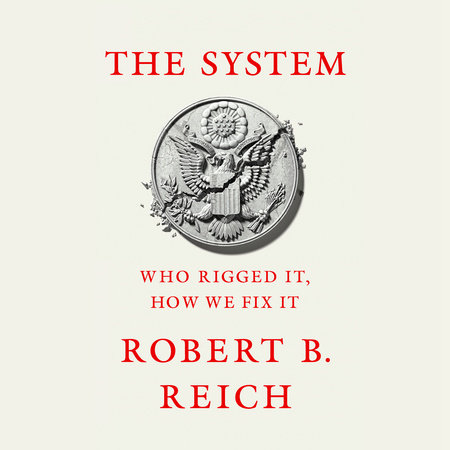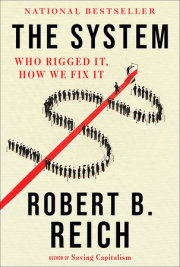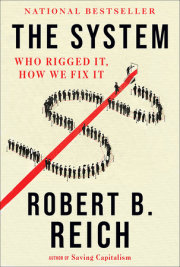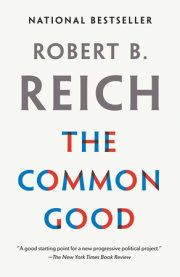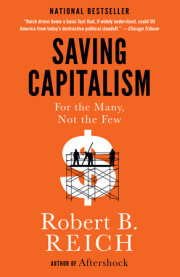Millions of Americans, whether on the left or the right of the political spectrum, know something has gone profoundly wrong. “Right now, we have a system that favors those who can pay for access and outcomes. That’s how you explain an economy that is rigged to corporations and to the very wealthiest,” said Beto O’Rourke at the first Democratic presidential candidates’ debate in 2019.
“When you’ve got a government, when you’ve got an economy that does great for those with money and isn’t doing great for everyone else, that is corruption, pure and simple,” said Senator Elizabeth Warren at the same forum.
“Big business, elite media, and major donors are lining up behind the campaign of my opponent because they know she will keep our rigged system in place,” said Donald Trump in his acceptance speech at the Republican convention in 2016.
“If solutions within the system are so impossible to find, then maybe we should change the system itself,” said sixteen- year-old climate activist Greta Thunberg.
As
New York magazine’s Frank Rich put it: “Everything in the country is broken. Not just Washington, which failed to prevent the financial catastrophe and has done little to protect us from the next, but also race relations, health care, education, institutional religion, law enforcement, the physical infrastructure, the news media, the bedrock virtues of civility and com- munity. Nearly everything has turned to crap, it seems, except Peak TV (for those who can afford it).” He might have added the environment and our democracy.
The concentration of wealth in America has created an education system in which the super-rich can buy admission to college for their children, a political system in which they can buy Congress and the presidency, a health-care system in which they can buy care that others can’t, and a justice system in which they can buy their way out of jail. Almost everyone else has been hurled into a dystopia of bureaucratic arbitrari- ness, corporate indifference, and legal and financial sinkholes that have become the hallmarks of modern American life.
This mammoth, systemic dysfunction is generating a great deal of heat—anger, upset, frustration, and outrage. Heat in any system signals potential change. Like tectonic plates that cause earthquakes and volcanoes as they crash into each other, heat is a sign of underlying tumult. In today’s America, the status quo is unsustainable. Subterranean tensions are building.
If you want to understand where the system is now and what you might do to help move it in a more humane direction, you will need to look beneath its surface and reassess many of your assumptions.
First, forget politics as you’ve come to see it, as electoral contests between Democrats and Republicans. Think power. The underlying contest is between a small minority who have gained power over the system and the vast majority who have little or none.
Don’t assume that a U.S. president or any other head of state unilaterally makes big decisions. Look at the people who enable and encourage those decisions, and whose interests those decisions serve.
Forget what you may have learned about the choice between the “free market” and government. A market cannot exist without a government to organize and enforce it. The important question is whom the market has been organized to serve.
Forget the standard economic goals of higher growth and greater efficiency. The issue is who benefits from more growth and efficiency.
Don’t be dazzled by “corporate social responsibility.” Most of it is public relations. Corporations won’t voluntarily sacrifice shareholder returns unless laws require them to do so. Even then, be skeptical of laws unless they’re enforced and backed by big penalties. Large corporations and the super-rich ignore laws when the penalties for violating them are small relative to the gains for breaking them. Fines are then simply a very manageable cost of doing business.
Don’t assume that we’re locked in a battle between capitalism and socialism. We already have socialism—for the very rich. Most Americans are subject to harsh capitalism.
Don’t define “national competitiveness” as the profitability of large American corporations. Those corporations are now global, with no allegiance to America. Real national competitiveness lies in the productivity of the American people—which depends on their education, health, and the infrastructure that links them together.
You can also forget the ups and downs of the business cycle. Focus instead on systemic changes that have caused the wealth and power of a few to dramatically increase during the last forty years at the expense of the many.
Forget the old idea that corporations succeed by becoming better, cheaper, or faster than their competitors. They now succeed mainly by increasing their monopoly power.
Forget any traditional definition of finance. Think instead of a giant gambling casino in which bets are made on large flows of money, and bets are made on those bets (called derivatives). The biggest winners are those who have better inside information than anyone else.
Don’t confuse attractive policy proposals with changes in the system as a whole. Even if enacted, such proposals at most mitigate systemic problems. Solving those systemic problems requires altering the allocation of power.
Don’t assume the system is stable. It moves through vicious spirals and virtuous cycles. We are now in a vicious spiral. The challenge is to make it virtuous.
Don’t believe the system is a meritocracy in which ability and hard work are necessarily rewarded. Today the most important predictor of someone’s future income and wealth is the income and wealth of the family they’re born into.
Don’t separate race from class. Racial discrimination is aggravating class divides, and wider inequality is worsening racial divides.
Think
systematically. Most people’s incomes haven’t risen for four decades and they are becoming less economically secure. Meanwhile, climate change is intensifying competition for arable land and potable water around the world, generating larger flows of refugees and immigrants. Together these facts allow demagogues to fuel bigotry by blaming immigrants for the stagnant incomes and economic insecurity.
Most important, you will need to understand the nature of power—who possesses it and why, how it is wielded, and for what purposes. Power is the ability to direct or influence the behavior of others. On a large scale, power is the capacity to set the public agenda—to frame big choices, to influence legislators, and to get laws enacted or prevent them from being enacted, to assert one’s will on the world.
Power has been leached out of conventional discussions about what is occurring. Power doesn’t show up in standard economics texts, finance courses, or even political science and law. But you cannot comprehend today’s system without con- fronting power head on. It is the most important subterranean force.
Power is exercised through institutions—big Wall Street banks, global corporations, the executive and legislative branches of government, the Federal Reserve and the Supreme Court, the military, elite universities, and the media (including social media as organized by Big Tech).
But these institutions don’t wield power on their own. Particular people have outsized influence over them. They include CEOs like Jamie Dimon, large investors, hedge fund and private equity managers, media moguls, key lobbying groups like the Business Roundtable, and major donors to political candidates and universities. As Greta Thunberg observes, “If every- one is guilty then no one is to blame. And someone is to blame. Some people—some companies and some decision-makers in particular—have known exactly what priceless values they are sacrificing to continue making unimaginable amounts of money.”
To comprehend the nature of these decision makers’ influence over the system, you’ll need to understand the role of wealth. In the system we now have, power and wealth are inseparable. Great wealth flows from great power; great power depends on great wealth. Wealth and power have become one and the same.
I don’t intend for these underlying realities to make you more cynical about the system or resigned to its intransigence. To the contrary, the first step to changing the system is to understand it. If we cannot comprehend the truth, we become entrapped in conventional falsehoods and false choices, unable to envision new possibilities. Seeing the system for what it is will empower you to join with others to change it for the better.
Copyright © 2020 by Robert B. Reich. All rights reserved. No part of this excerpt may be reproduced or reprinted without permission in writing from the publisher.

